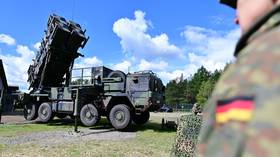No NATO-Russia clash over Ukraine – Berlin
The US-led military bloc will not become directly involved in the conflict, Chancellor Olaf Scholz has pledged
Germany will continue to pour money into Ukraine but will not do anything that places Berlin in direct conflict with Russia, Chancellor Olaf Scholz has vowed.
The German leader drew the red line in an opinion piece published on Thursday in The Economist. His position sharply contrasts with that of French President Emmanuel Macron, who maintains that the option of putting NATO boots on the ground in Ukraine must not be ruled out.
“It is important to be crystal clear that NATO does not seek confrontation with Russia – and that we will not do anything that could turn us into a direct party to this conflict,” Scholz stressed.
Both European leaders blame Moscow for the ongoing hostilities, but have diverging views on how involved their respective nations could become in the conflict. Macron, for example, agree to provide Kiev with French air-launched mid-range SCALP missiles, but Scholz declined a similar move, arguing that German military personnel must not take part in the preparation of Ukrainian strikes against Russia.
The chancellor talked up his nation’s increasing military spending and newfound willingness to station soldiers outside of its borders, namely in Lithuania, close to the border with key Russian ally Belarus. Unlike under Adolf Hitler, “this time German troops came in peace, to defend freedom and to deter an imperialist aggressor,” Scholz wrote.
The Russian leadership denies that its military campaign against Ukraine is motivated by conquest. Instead, Moscow has insisted that it is countering a threat to its national security, stemming from NATO’s expansion in Europe and growing presence in Ukraine after the 2014 armed coup in Kiev.
In the early weeks of hostilities, a peace treaty was pre-agreed with Kiev, under which Ukraine would have pledged neutrality and agreed certain limits on its military strength. The Ukrainians later pulled out of the talks, insisting they must achieve a military victory over Russia with Western-donated weapons.
Scholz noted that EU members have become “by far Ukraine’s biggest financial and economic supporters,” vowing that “Germany will support Ukraine for as long as it takes.”
The chancellor believes that opposing Russia has had a unifying and invigorating effect on the EU and NATO. A vocal minority in both organizations, however, has described the Western response to the crisis as disastrous for Europe. Hungary and Slovakia have called for peace talks and an end to the confrontation. Non-EU NATO member Türkiye declined to impose sanctions against Russia from the very start of the crisis.






Comments are closed.